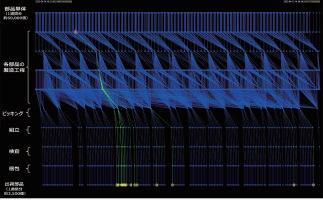






The University of Tokyo’s Institute of Industrial Science (IIS), based in Komaba, Meguro-ku, Tokyo, is a research institute that mainly covers engineering disciplines.
More than 120 faculty members – professors, associate professors and lecturers –each have their own laboratory for pursuing research.
IIS is fostering and supporting young researchers by equally distributing research resources to these laboratories, including those headed by young researchers. More than 1,000 researchers from Japan and other countries are carrying out various types of research – from fundamental research to applications – which opens the door to our future life.
Laboratories belong to one of five research departments. About half of them also belong to research centers or research platforms. Some laboratories join and form a research group, a study group or a research unit with the common purpose of research. Sometimes they develop into research centers with their own budget and space.
The IIS research field is very crossdisciplinary and covers almost all engineering disciplines, from micro and nano scales such as the quantum level, to large-scale ones such as the global level and space. IIS is one of the largest university-attached research institutions in Japan.



Creating new technology is IIS’ fundamental principle, with two driving forces: basic research aiming at creation of intellectual value and systematization of scientific scholarship on one hand, and applied research aimed at contributing to society and industry by making use of the latest and most comprehensive approach on the other. Our mission is to communicate and integrate our intellectual products to the society, industry, and the world. We are actively engaged in various activities, as a hub to develop human resources that can generate such research. The research pursued by our labs can be roughly divided into the areas described at right.
We aim to attain these goals in scope by fusing the five following research departments.


Department of Fundamental Engineering
This department covers a wide range of research, from microscale to macroscale, to evaluate and establish models for the properties/ mechanical properties of solid and liquid objects, which are fundamental issues for engineering and science.


Department of Mechanical and Biofunctional Systems
This department conducts research and development involving new machines, devices and systems based on knowledge from a wide range of fields, including mechanical engineering, precision engineering, ocean engineering and bioengineering.




Department of Informatics and Electronics
This department aims to help realize an affluent future society with the power of informatization by pursuing research in the energy/regulation, device/properties and information/ communication fields.
Department of Materials and Environmental Science
This department conducts extensive research ranging from fundamental studies on substances/materials, including organic and inorganic compounds and metals, to engineering designing and research into advanced applications.


Department of Human and Social Systems
This department is engaged in multifaceted research into urban areas, regions and global environments, which are dynamic “places” supporting life forms, including humans, as well as their interactions with human behaviors and activities.


Research on
micro/nano devices
and their application for social innovation
Basic research
toward elucidation of the basic principles of physical phenomena and development of new core technology


Frontier research integrating the world of bio and engineering
Cutting-edge IT research to support people and society
Research regarding contribution to resource and environmental issues and SDGs on the global scale
Research for innovation by
material and process
development
Research into advanced manufacturing and value creation design
Research into smart and strong cities to contribute to sustainable societies


We are collaborating with many University of Tokyo graduate schools and undergraduate faculties, while also cooperating in various aspects with other domestic and international institutions.
We have a system of collaborating with the industrial sector, such as joint research with the private sector, etc., and research commissioned by the sector, thus promoting interactions with researchers and engineers in the private sector.
We are engaged in robust international academic exchange, centering on joint research with foreign researchers, dispatching researchers abroad, and educational activities toward international students.


Research Platforms
LEAP
Corporate Sponsored Research Programs

Design-Led X Platform


Social Cooperation Programs

Research Centers

Statistical Information
Personnel and Students / Settlement / Research Activities


programs (to be established by inviting project professors, etc. from outside the university) and social cooperation programs.

Example of Collaborative Research with Industries

collaboration with IIS?



Nickel, lithium, and cobalt resources - from recycling to application in active materials
Example of Corporate Sponsored Research Programs
Nikon Optics and Precision Frontiers
Example of Entrusted Research Localization method of AUVs for swarming

Example of Social Cooperation Programs
Big Data Value Co-creation Platform Engineering







IIS is focusing on education to working members of society, mainly engineers in the private sector, to foster researchers and advanced engineers. It also promotes international education by accepting international students and researchers, and widely disseminates research results to society through lectures and seminars. IIS also takes advantage of its characteristics to provide education in unique ways, such as its research-based science education provided to young people.
Business Partners

We are 100.
From nanoscale to cosmic phenomena, Exploring unknown principles with curiosity as a guide Chaos, with 100 laboratories.
We are 1.
A swell of intelligence that happily engulfs
The voices of society, different fields, objections and even coincidences. A movement that is independent and interconnected.
We are innumerable.
The many possibilities that the world has yet to discover
We find out earlier than the future
And continuously propose outstanding values. Institute for a Possible Future.
Komaba Research Campus (Komaba Ⅱ Campus)
4-6-1 KOMABA MEGURO-KU, TOKYO
153-8505, JAPAN
E-mail: koho.iis@gs.mail.u-tokyo.ac.jp
Phone: +81-3-5452-6017
(Public Relations Office / Public Relations Section)
Fax: +81-3-5452-6071
Komaba Ⅱ Campus Access




Kashiwa Campus
5-1-5 KASHIWANOHA KASHIWA-SHI, CHIBA
277-8574, JAPAN (Kashiwa Campus)
6-2-3 KASHIWANOHA KASHIWA-SHI, CHIBA
277-0882, JAPAN (Kashiwa Ⅱ Campus)
E-mail: kashiwa.iis@gs.mail.u-tokyo.ac.jp
Phone: +81-4-7136-6971 (Kashiwa Office)
Fa x: +81-4-7136-6972
Kashiwa Campus Access


